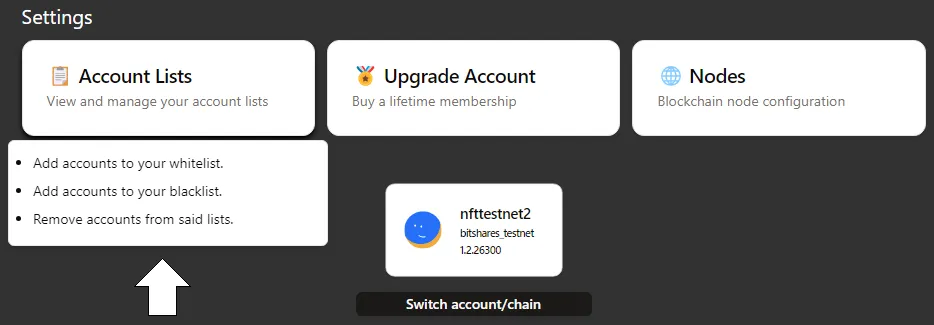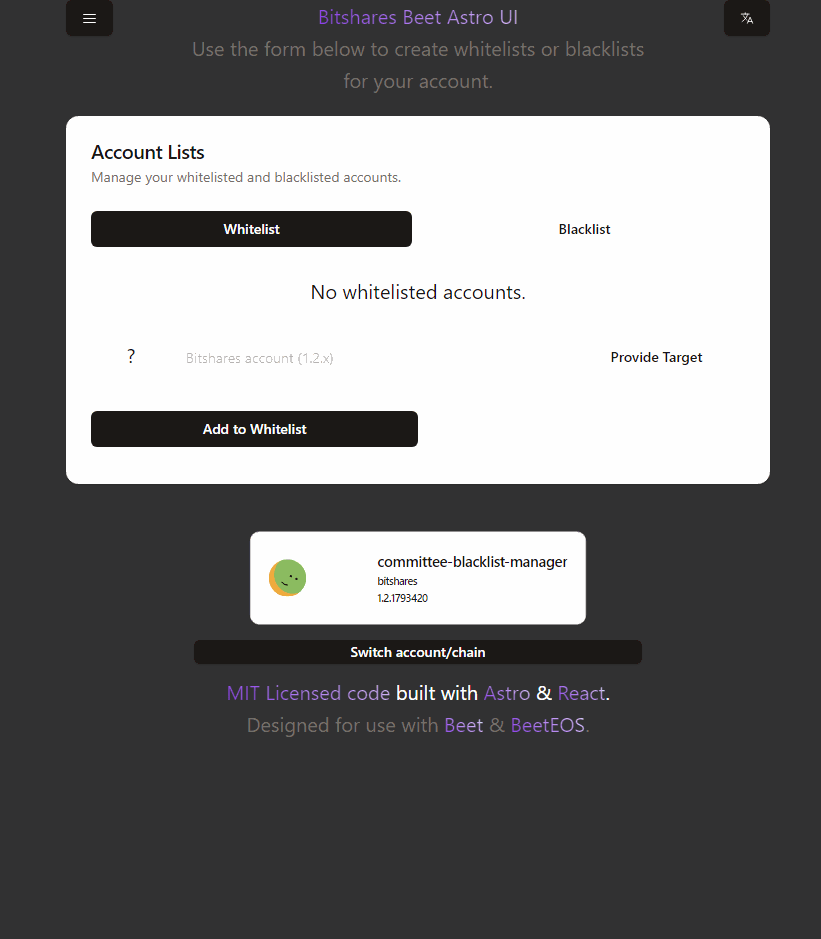
Bitshares Astro October Dev Update - Account lists!
Thank you for exploring the latest Bitshares Astro UI development blog!
The Bitshares Astro UI aims to be an ongoing, innovative project, enhancing Bitshares front-end user interfaces with cutting-edge technology for 2024 and beyond.
So, what’s in today’s update?
A new page has been added - Managing account lists!
There's a new release for the Bitshares Astro UI project! Check it out
What are account lists?
The Bitshares blockchain offers the account_whitelist operation:
{
authorizing_account: "1.2.x",
account_to_list: "1.2.x",
new_listing: 0,
extensions: []
}
.
This operation enables you to create an account whitelist or account blacklist associated with your blockchain account.
When you query your account's data, the whitelisted and blacklisted accounts will be included:
{
"whitelisted_accounts": [],
"blacklisted_accounts": [],
}
.
The new_listing property enables you to assign an account as follows:
| New Listing | Effect |
|---|---|
| 0 | Not on either list |
| 1 | Whitelisted |
| 2 | Blacklisted |
| 3 | On both whitelist and blacklist |
Note that you can only assign an individual account to these lists at a time, so if you have a lot of accounts to put on lists you'll need to broadcast multiple operations to implement your account lsits.
What is the point of these lists?
Account whitelists and blacklists offer a flexible mechanism to control access to blockchain features and assets. They serve as powerful tools in maintaining both security and regulatory compliance within decentralized systems like Bitshares. Here are some practical and theoretical uses of account lists:
Practical Applications:
Fraud Prevention and Scam Mitigation:
- These lists are critical for identifying and blocking scammer accounts that aim to exploit the ecosystem. A prime example is the use of blacklists by the committee-blocklist-manager, which helps keep the community safe by maintaining a known set of malicious accounts.
- By blacklisting these accounts, the Bitshares Astro UI prevents them from accessing the user interface. Additionally, blacklisted accounts are barred from receiving airdrops via the Bitshares Airdrop Tool. This creates a safer and more trusted environment for both developers and users.
- Gateways, such as XBTS, leverage these lists through operations like
override_transfer, where they can legally freeze exchange-backed assets if they fall into the hands of blacklisted users. This is a strong deterrent against criminal misuse of funds on the platform.
Restricting Access to Specific Assets:
- Developers can create whitelists to specify which accounts are allowed to interact with certain assets. This becomes useful for projects that need to adhere to strict regulations, such as securities or tokens that require Know Your Customer (KYC) verification. Only approved users can transfer, hold, or trade these assets, helping ensure compliance with legal frameworks.
Sanctions Enforcement and Compliance:
- In a decentralized environment, certain jurisdictions or regulatory bodies may require that specific users or regions be restricted from accessing blockchain assets. For example, if a government imposes sanctions on users from a particular country, these users could be placed on a deny list, effectively preventing them from interacting with specific assets or features on the Bitshares platform.
Theoretical and Future Use Cases:
Permissioned Blockchain Operations:
- In the future, these account lists could be used to create more sophisticated permissioned environments within the decentralized exchange (DEX). For instance, a company launching a tokenized security could maintain a whitelist of accredited investors allowed to trade that security, while others would be denied access. This would be particularly valuable in industries that require strict access control, such as real estate tokenization or securities trading.
Geopolitical and Regulatory Compliance:
- Whitelists and blacklists could be used to enforce compliance with international trade laws, ensuring that assets are only accessible by users from allowed countries or regions. This would allow Bitshares to operate globally while adhering to localized legal requirements, such as GDPR compliance or sanctions imposed by governments.
Dynamic Governance and Voting:
- These lists could also play a role in decentralized governance. For example, voting tokens could be restricted to whitelisted participants who meet certain criteria (e.g., KYC-verified members or stakeholders with a significant investment in the platform). Similarly, malicious actors identified by the community could be blacklisted from participating in votes, preventing them from influencing the governance process.
"Ring of Trust" Networks:
- A theoretical future use case could involve the creation of "trust networks" or a "ring of trust" system. In this scenario, users could whitelist each other, gradually building a network of trusted accounts. As more users mutually whitelist each other, this web of trust would grow, creating a decentralized reputation system. Accounts that are consistently whitelisted by reputable users could be considered more trustworthy within the network.
- This system could evolve into a trust score or reputation-based governance model. Projects or assets might only allow interactions from accounts within a certain trust threshold, creating a self-reinforcing cycle of reliability. This would be particularly useful for decentralized applications (dApps), peer-to-peer marketplaces, or governance systems that require a high level of trust without centralized oversight.
Custom Asset Interactions:
- Asset creators could leverage whitelists to restrict certain asset interactions to specific groups of users. For instance, a game developer could allow only premium users to interact with in-game assets or tokens, while blocking standard users. Conversely, deny lists could be used to prevent bad actors from using the assets for unintended purposes, such as exploiting game economies or engaging in unfair trading practices.
Demo time!
This feature has been placed under "Settings" on the home page:

And here's a live demo!

You can see the list of all the blocked users in the committee-blacklist-manager account, you can easily remove existing blocked users, add suspicious users to the blacklist or likewise add users to your account's whitelist.
So, how will you make use of this functionality? Comment below!
Check out the previous hive posts regarding the Astro UI:
- Observing the live blockchain! Recent average statistics, transaction data, earnings, charts, etc!
- Creating Smartcoins via the Astro UI
- Creating User Issued Assets & Issued Asset Overviews
- Creating Vesting Balances
- Same-T Funds
- Prediction Market Assets
- Credit offer overviews & Vesting balance claims
- Favourite assets & Portfolio tweaks
- Simple swaps & node configuration
- Electron packaging
- Announcement thread
Thanks for reading this far, I'm looking forwards to any comments you have!
Download the Bitshares Astro UI today! https://github.com/BTS-CM/astro-ui/releases